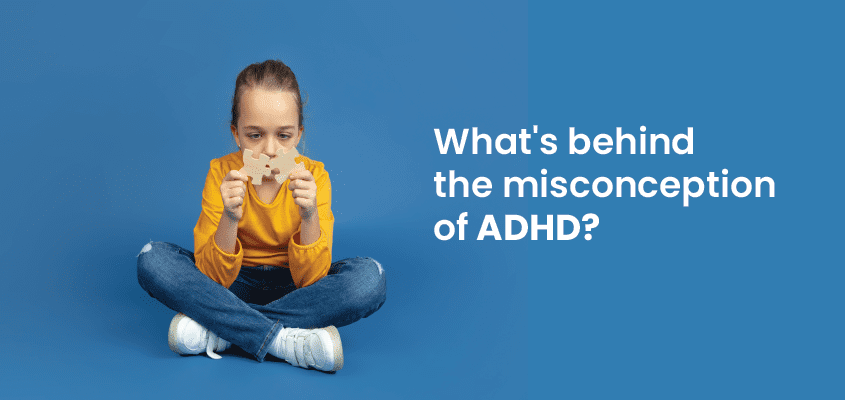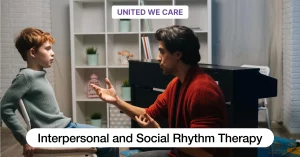Introduction
ADHD, or attention-deficit hyperactivity disorder, is one of the children’s most commonly found neurodevelopmental disorders. It frequently persists into adulthood and is usually initially diagnosed in childhood. Children with ADHD might struggle to control impulsive behaviours, pay attention, or be hyperactive.It is pretty standard for all children to struggle with paying attention and maintaining good manners. However, these behaviour patterns do not simply disappear with age in children with ADHD. The symptoms remain unresolved and can worsen, making managing interactions with friends, family, and coworkers challenging.Over the past few decades, we’ve seen a lot of false information being spread about the causes, diagnoses and treatments of ADHD. Well, we’re here to bust some myths about the condition. Read on to find some common misconceptions about ADHD and the truth.
Busting the myths about ADHD
#MYTH 1
It is too early for my youngster to have ADHD
Many parents think that school-aged children only experience ADHD as a problem. However, ADHD symptoms and diagnoses may start as early as preschool[1]. Even medical professionals occasionally struggle to distinguish between ‘normal’ behaviour and signs of ADHD in preschoolers.Although it’s common for young children to engage in impulsive or hyperactive behaviour, these actions can also be signs of ADHD. To assist in making the diagnosis, a paediatrician will assess the severity of these behaviours in a preschooler. ADHD is diagnosed when these issues significantly and repeatedly interfere with a preschooler’s life, development, self-esteem, and general functioning [3].
#MYTH 2
My child is unmotivated and lazy
This presumption is a typical reaction to the behaviour displayed by a child with ADHD. A child who struggles to concentrate in class or finish a lengthy essay might attempt to save face by pretending they do not want to or are simply too lazy to finish. But although this behaviour may indicate that the child is unmotivated, it is caused by functional difficulties. Every child wants to be successful and receive praise for their efforts, and if these tasks were simple for children with ADHD to complete, they would appear just as ‘motivated’ as anyone else[3].
.#MYTH 3
Poor parental discipline leads to ADHD
ADHD is not the consequence of ineffective parenting, even though behaviour patterns associated with the disorder can interfere with otherwise successful parenting methods. However, inconsistent limit establishment and other ineffective parenting techniques may exacerbate ADHD symptoms. Several tried-and-true parenting methods can assist children with ADHD in controlling their actions.[3]
How does the misconception of ADHD affect children?
ADHD is one of children’s most prevalent and difficult neurobehavioural conditions [2]. However, there is still a lack of understanding of the condition and the significance of its diagnosis and treatment among many community groups, including parents, educators and healthcare professionals. For example, the decision of parents to seek or accept medical advice and treatment after the child has been evaluated can be influenced by their belief that ADHD is a neurobehavioural disorder that needs medical management. Many parents refrain from requesting an assessment for their child due to various beliefs or misconceptions about ADHD and the causes of their children’s behaviour.
How to overcome the misconception of ADHD
Many people don’t think ADHD is a legitimate medical condition despite evidence to the contrary, and they view it as an excuse for negligence or laziness. This is only worsened by the fact that ADHD symptoms seem to come and go depending on the circumstances and may not be visible when the child is being monitored.There is also widespread disapproval of the psychiatric medications prescribed for ADHD. The number of people taking ADHD medication has increased in recent years, and some question whether this increase is necessary.However, self-stigmatization frequently causes the most harm. Since they find it difficult to view themselves realistically, people with ADHD often find it challenging to avoid discrimination.Recognizing when stereotyping is targeting you is simpler the more cognisant you are. Of course, it’s also critical to understand that sometimes constructive feedback about oneself can be accurate and valuable.Another strategy for avoiding the detrimental effects of stereotyping is to act positively. It is empowering to join others in the fight to end discrimination. Therefore, email the individuals responsible for those portrayals whenever you see prejudiced, demeaning depictions of people with ADHD in the media.
Conclusion
Make sure your child knows what it means to have ADHD if you are the parent of one. Learning about the symptoms of ADHD can help you understand why your child struggles with specific tasks and may require more effort than others. Ensure your child’s school knows that ADHD is an actual disorder and that it might be required by law to make accommodations for any disability.For adults, this is a problem; if they keep their ADHD a secret, they can avoid the potential discrimination that comes with it. However, they run the risk of experiencing indirect discrimination. People may assume you are forgetful or impulsive if they observe you being disorganised and do not know you have ADHD.If you feel you or your child has ADHD, seek expert advice today. We at United We Care have a team of caring psychologists to help you improve your mental well-being. Visit our website today.
References
- S. Wigal, P. Chappell, D. Palumbo, S. Lubaczewski, S. Ramaker, and R. Abbas, “Diagnosis and treatment options for preschoolers with attention-deficit/hyperactivity disorder,” J. Child Adolesc. Psychopharmacol., vol. 30, no. 2, pp. 104–118, 2020.
- Fbhwa.org. [Online]. Available: https://fbhwa.org/uploads/facts/FBH-Facts_ADHD.pdf. [Accessed: 10-Mar-2023].
- “8 ADHD myths & misconceptions,” Healthychildren.org. [Online]. Available: https://www.healthychildren.org/English/health-issues/conditions/adhd/Pages/Myths-and-Misconceptions.aspx. [Accessed: 10-Mar-2023]





